Before starting any construction project, you need to create a construction budget. The construction budget outlines all of the costs you expect to complete the project and the estimates for how much each portion of the project will cost.
When done well, the budget is an attempt for you to forecast all of the costs for a construction project, though it is a good idea to leave a little wiggle room in case an unexpected cost does show up. A construction budget template will help you keep your finances in order during a construction project, without cutting corners or eating into the profits of the project
A Construction Budget is the amount of money set aside for a remodeling project or a specific building. These budgets help anticipate all of the expenses and costs that come with any building project.
The exact amount allocated to each category of the budget will depend on the size and scope of the building project. There are different ways to monitor and track a construction budget, but it is often done through a construction budget template like a spreadsheet.
Other costs may appear as the project begins. The project may take longer, which can increase your labor costs. The client may change some of the requirements for the final project, which requires you to get more materials to get it done. Your construction budget can be flexible, allowing some of these changes and helping you keep costs in check.
Importance of a Construction Budget
A construction budget is a great tool to help get any construction project on track. If you go into a construction project with no idea how much money you will need for labor, materials, and other expenses, the less profit you will make. This can also make the project take longer than anticipated. Making a budget allows you to take account of most construction costs ahead of time and keeps you on schedule.
No construction company or contractor goes into a project hoping to lose money. But if they do not have a construction budget in place, it is straightforward for them to overspend. When this happens, the loss of money comes out of their pocket, not the clients. A construction budget template helps monitor and track expenses to provide a baseline for the costs of a project, helping the construction company earn a profit on their work.
Direct, indirect, and overhead costs
All of your costs for a construction project will fit into three categories. The first is direct costs. These are all costs that immediately come to mind when you start the project. Without these costs, the project would not happen at all. They may include the materials used in the project, the heavy equipment for the building process, and the labor for all of your crew.
The second category is general conditions. These are also known as indirect costs. They may include any pre-construction costs, organization costs, and operation costs of the project.
The third category of the construction budget out will be the profit and the overhead. Your profit during this project will be the difference between what you earn on a project from the client and the amount you spend. You want to make sure you earn some profit when you are done calculating all of the costs without making the final amount of the project too high. The operating costs are significant too. They include all of the expenses you have to pay to run your business, including paying for a secretary, office space, and advertising
Which Expenses to Include in a Construction Budget Template?
When you create your construction budget, you will need to include everything ahead of time. If you miss out on some categories, it can cut your profits and make it difficult for you to make enough of your work. Some of the expenses you should include in your construction budget includes:
Property costs
This cost will vary based on where you do the work and the project’s scope. You will need to look at where the project will be done before coming up with the price. Consider the price of the lot, any fees that you pay in real estate, the financing you have to hold onto until the project is done, and taxes.
Your property costs can vary based on the project you plan to complete. The land cost may be as high as 60% of the total construction budget for the project. However, if you have some freedom on where to place the project, it is possible to get that amount down to 10% of the budget.
Remember that the land costs will not stop right at the price of the plot. You must include taxes, financing, and real estate fees to that number too. This amount can seem high on a construction value, but it is essential to plan out since the land is a capital cost and can maintain or increase in value each year. Calculating the value accurately from the beginning will help keep your construction budget template organized and shows the client how the value of the land changes over time.
Professional fees and services
Before you can begin your project, you may need to consult with some professionals. You may need to get a survey done on the land to know where your property lines are. Most projects will require permits to help with building, electrical, and engineering needs.
Some of the professional fees and services that you may incur while working on a construction project include:
- Fees you pay to a real estate agent for finding or managing the property
- Accounting and banking fees, including those you pay for tax time.
- Professional engineering stamps that are required as part of local statutes
- Design services, including master planning that you cannot do independently.
- Any fees to make sure the plot is suitable for your building needs. These include testing and surveying fees.
- All permits are necessary for your local government. Check with your town hall to ensure all permits are picked up on time.
Any time you need to hire a professional to help out with the project or do additional work to get the site ready for construction, these fees need to be added to your construction budget template.
Material costs
With a good relationship with your suppliers, you may be able to negotiate some of the costs for the materials on the project. Material costs can eat up a big part of your budget, and you need to get the materials and lock down the price early on before they can go up. Look into the final costs for the materials and estimate how long they will stay at that price to get an accurate amount.
Depending on the type of construction project you plan to do, you may have to pay for some materials to get the work done. This can include building structure and site preparation costs.
Site preparation costs will include the materials you use to prepare the lot before any building occurs. If you have to lay down pipes and drains, pave the lot, or do any landscaping, these will be included in the site preparation costs.
Building structure costs will be any of the materials you use directly in the building process. This can include framing, insulation, roofing materials, and even the doors and windows.
Labor
No one will work on your crew for free, and you can’t do a large on your own. So you will need to pay for everyone who will work for you. This includes any tradespeople you hire specifically for this project, your subcontractors, anyone to operate the machinery, and your office staff. Include their hourly wages for the work and any benefits you pay for them, including vacation and workers’ compensation.
Tools and expenses
Your labor and materials will take up a significant portion of the budget, but you also need to pay for the right tools to get the project done. If you need to rent a new tool or purchase it to help with this project, you must add that to the budget. Operating costs also need to be factored into the budget, including all costs for labor and operators who work on the project. Also, don’t forget to add any maintenance costs and fuel for the tools you already own.
Project management charges
Your business has office space that needs to be used well to help you keep costs down and run everything. You need to pay for those somehow, and the costs can be added to your construction budget, especially if you have to get new software or other items just for this project. To keep your business running, you can add costs for project management software, office space, internet connection, utilities, office supplies, and more.
Liability insurance and professional bonds
It would be best to carry liability insurance for all construction projects legally. Things can go wrong on the project, and if you do not have insurance, the costs can be enough to shut you down. You may also need to have a bond or deposit as a show of faith that your company will follow through. Before the project begins, you must have all of these in place.
Some projects will require you to have performance and payment bonds. These are most likely to show up during a government contract. The goal of these bonds is to ensure that everyone who works on the project will get paid, and no one will have a legal right to put a lien on the property. Factor in the costs for the payment and performance bond into the project’s cost, along with any membership costs for belonging to a contractor’s association.
Utilities and taxes
Any utilities you use for the project or in your office space must also be accounted for. This can include electrical costs, sewer, water, and gas for the building site. In addition, the land where the project will be done will have local and state taxes levied against it. The rates will be determined based on where you do the project. Make sure to account for these in your budget, or you will need to pay this independently.
Contingency
This category in your budget allows you to have some breathing room. There can be unexpected expenses that will show up during the project, and having this breathing room helps you get the project done without losing all of your projects. Keep your contingency fund between three to ten percent of the total budget, based on your risk comfort level when you start.
Phases of Creating a Construction Budget
After you write down all of the categories of your construction budget, it is time to get all of the numbers written down. The following are the four main steps that you can follow to help you create a construction budget:
Research and analysis
It is time to do some research to determine how much the project will cost. Writing down the numbers arbitrarily will result in inaccurate figures that can hurt your bottom line. Instead, take the time to review historical data for similar construction projects, talk with your suppliers to see what deals they can provide, and understand the project you are about to do. This will help you set realistic expectations on how this project will go and how much it may cost.
Design and development
Your research should lead you to the design that you plan to use. Your project manager will then use this information to create a list of all the materials and items they need to get the project done. This will include the estimations of costs for that project. With a list of all projected costs, you can begin the bidding process, which is when you can choose your general contractor and set a good framework for building the budget for the project.
Documentation and pre-construction
You will need to speak with your stakeholders at this point. This step helps you highlight some of the potential issues that may come up and gives you time to fix them before beginning. When you document your pre-construction phase, you create a paper trail to show where the unexpected costs will show up and can keep those to a minimum for the best results.
Construction and closeout
This can be the most extended phase because it includes the time you take working on the construction project. Your goal is to keep the costs as close to your projected budget. However, there are times when things will not go as planned, and you will need to make changes. Therefore, all changes must be tracked and noted. This helps you see why things went over the construction budget and can be used as a guide for the next project you do that is like this one.
Construction Budget Templates
Each construction project is unique based on what will happen during the project. Therefore, you will need to complete some research to fill in the numbers that work for your costs. Having a construction budget template can make this as simple as possible. This website provides free downloadable construction budget templates to help you keep track of expenses throughout the construction project. These templates will make this process easier.
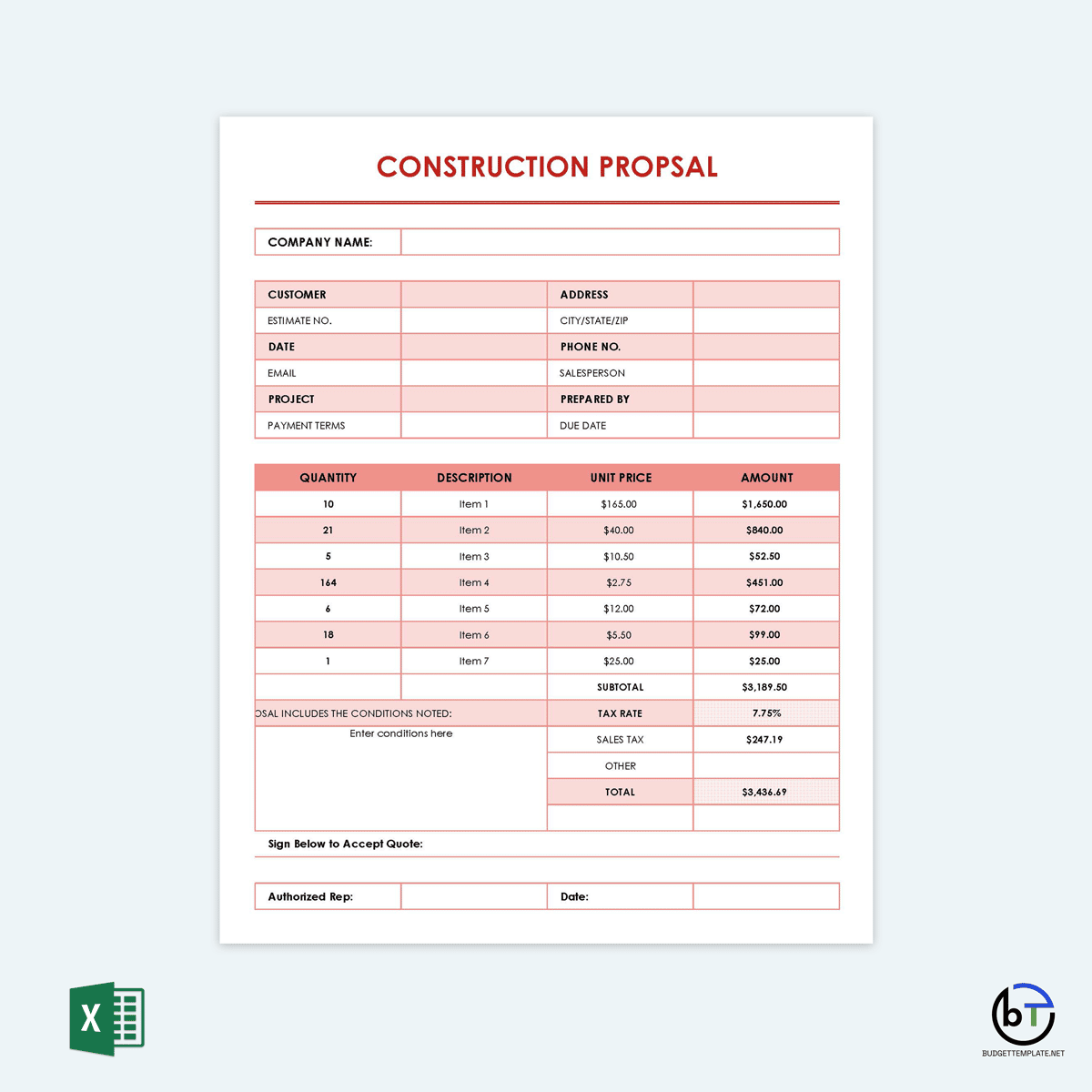
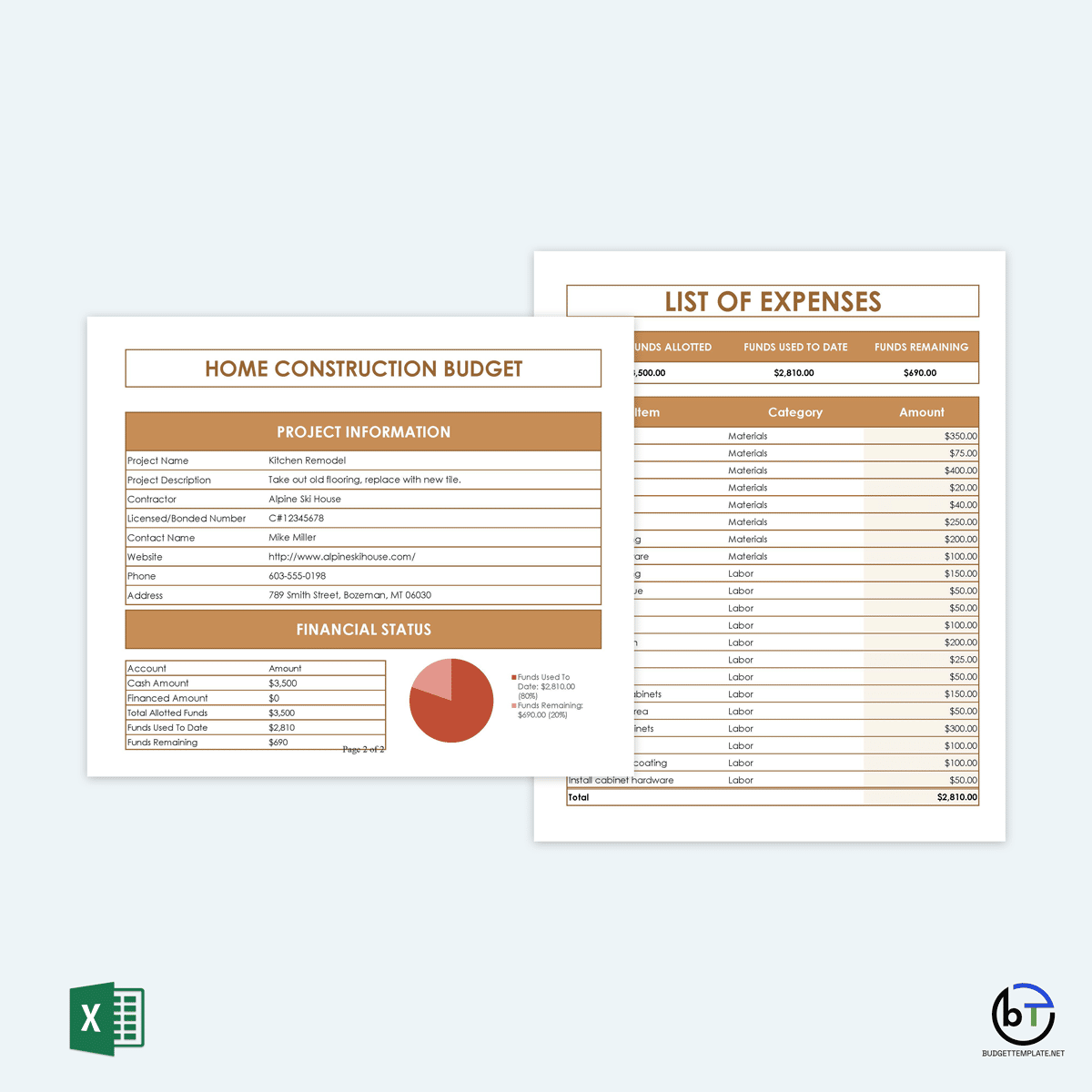
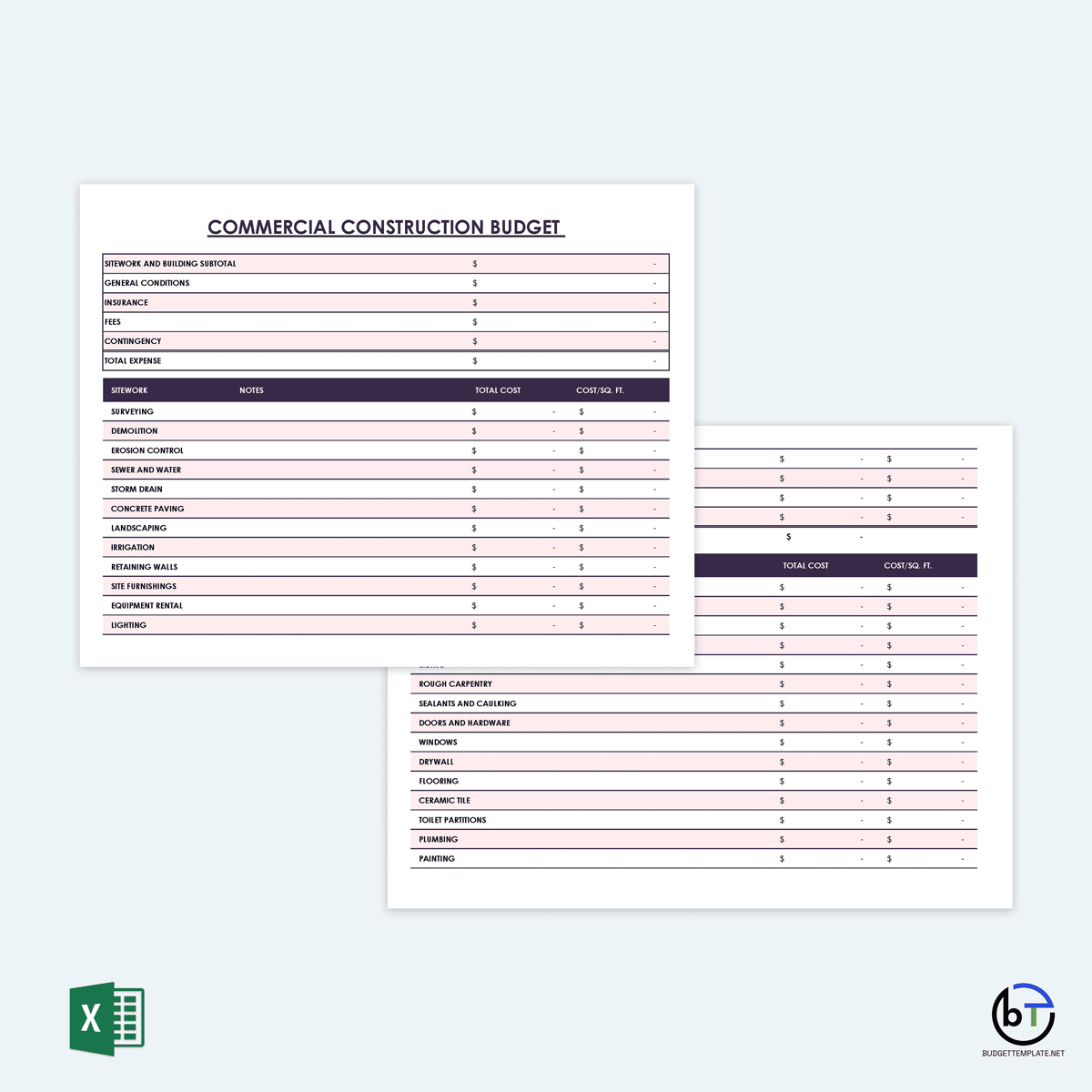
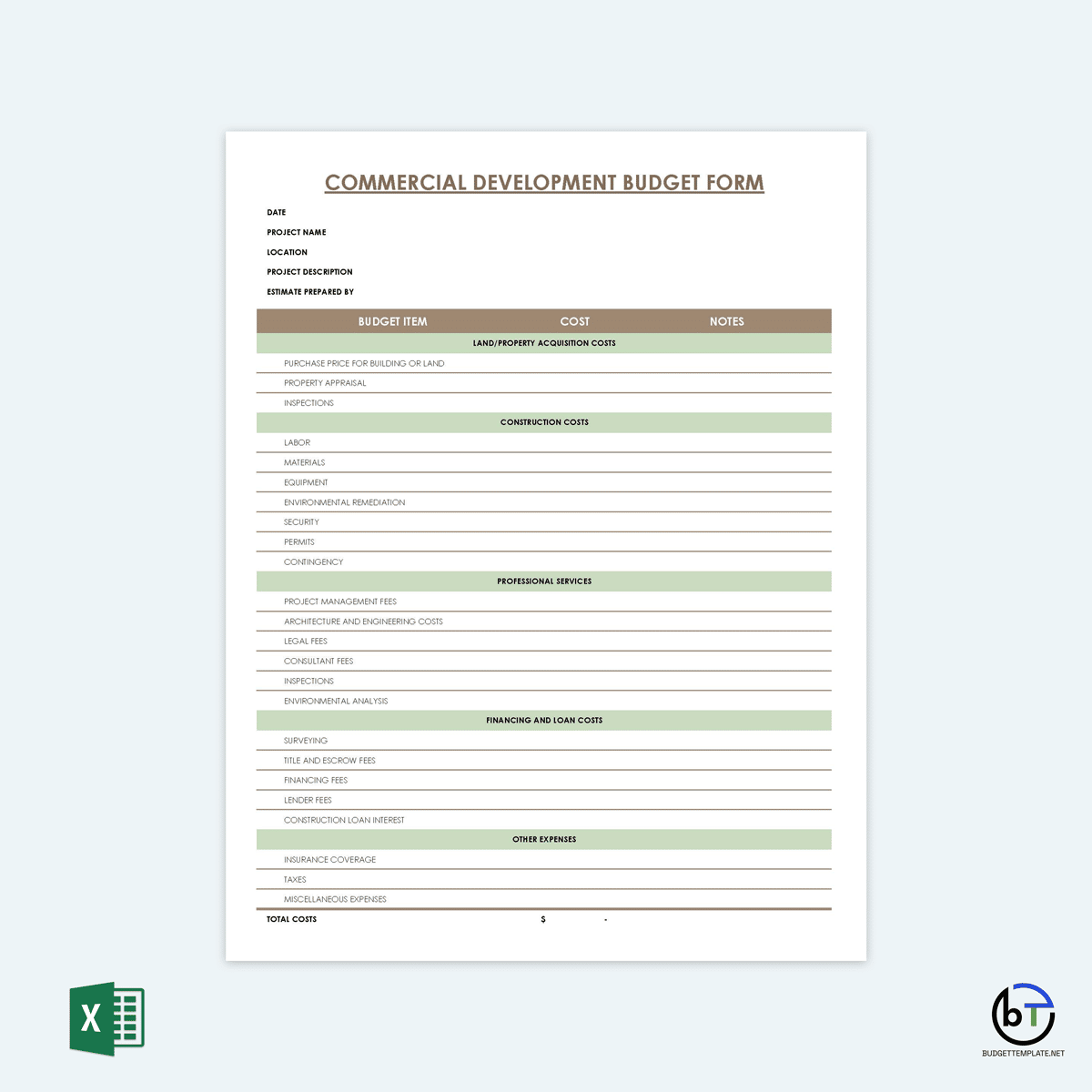
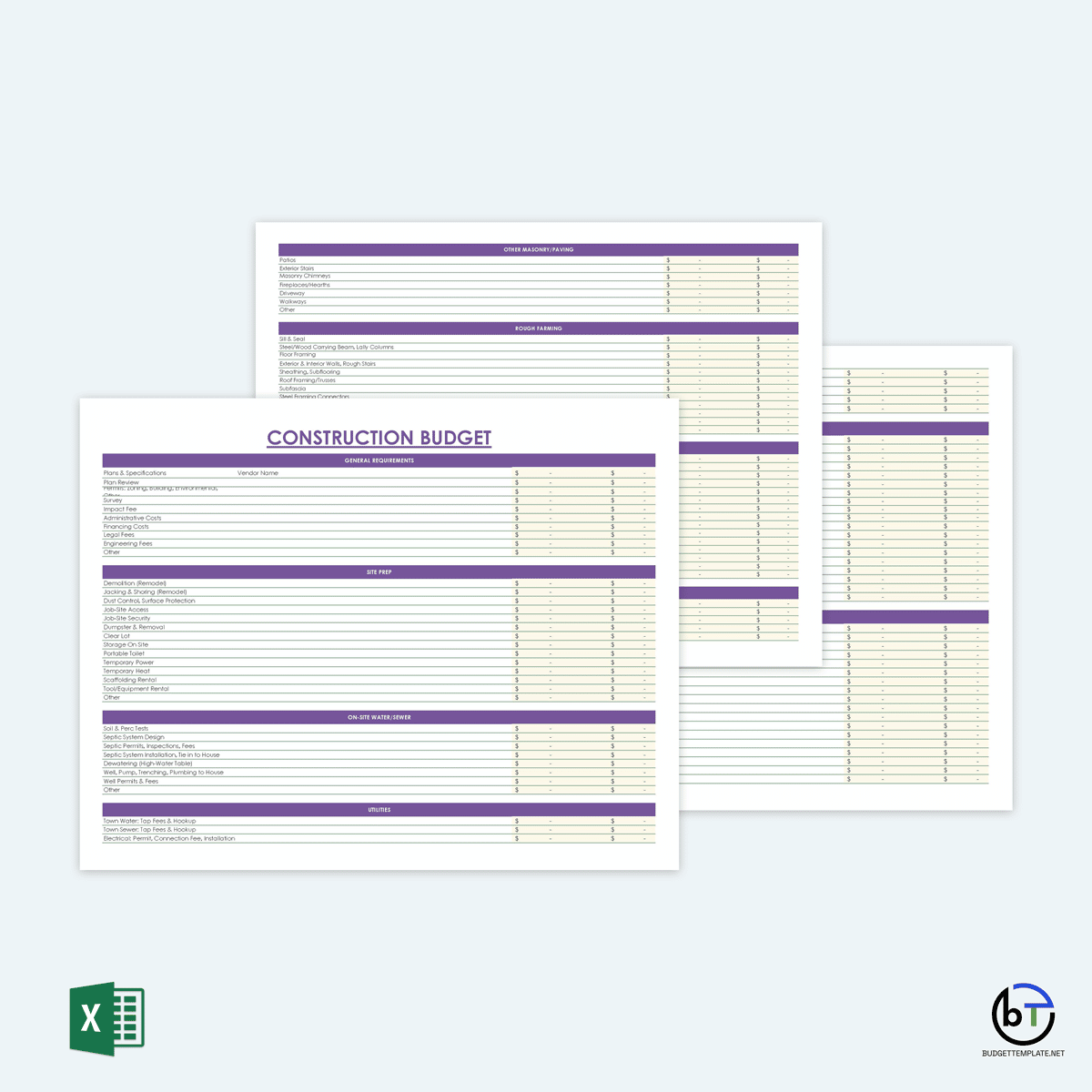
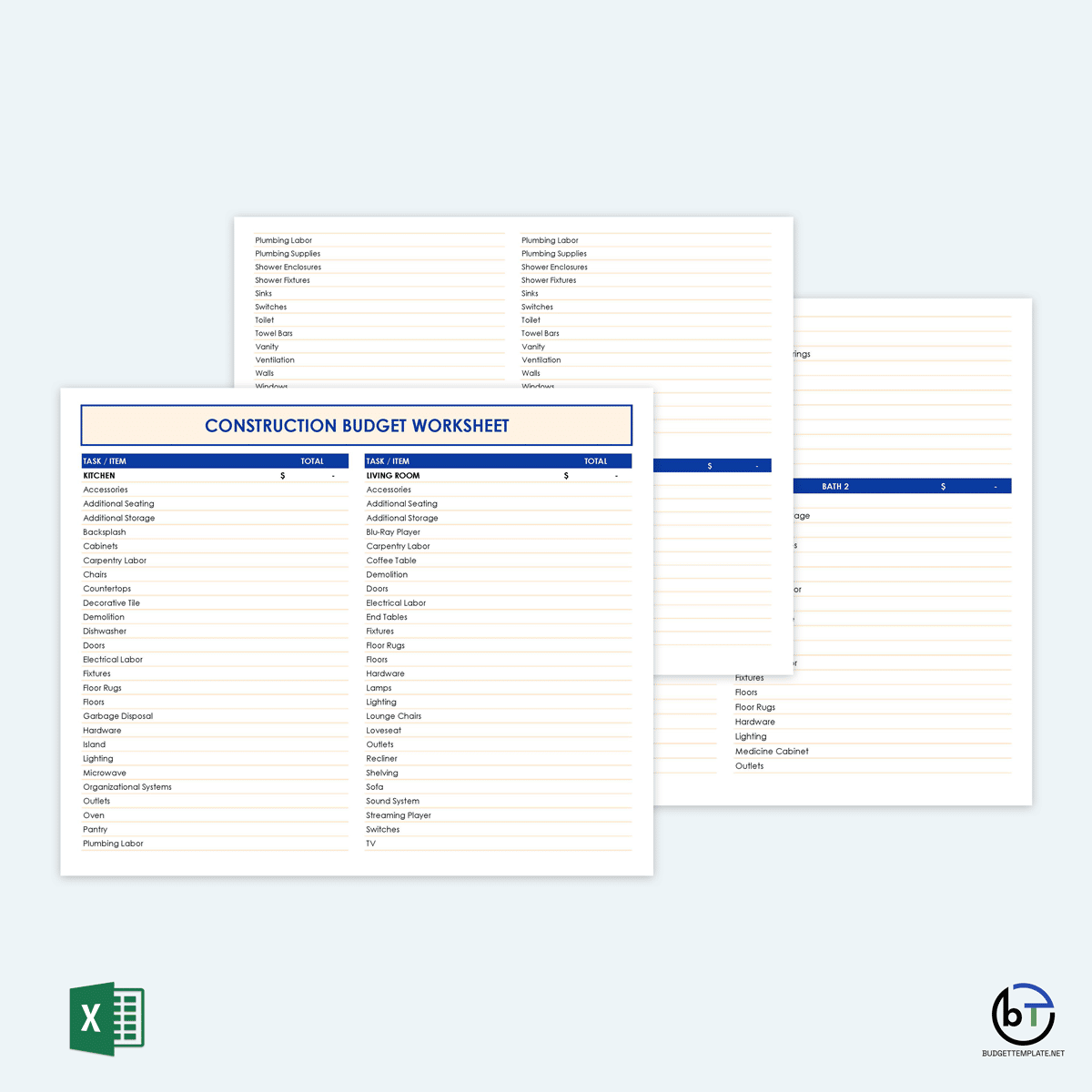
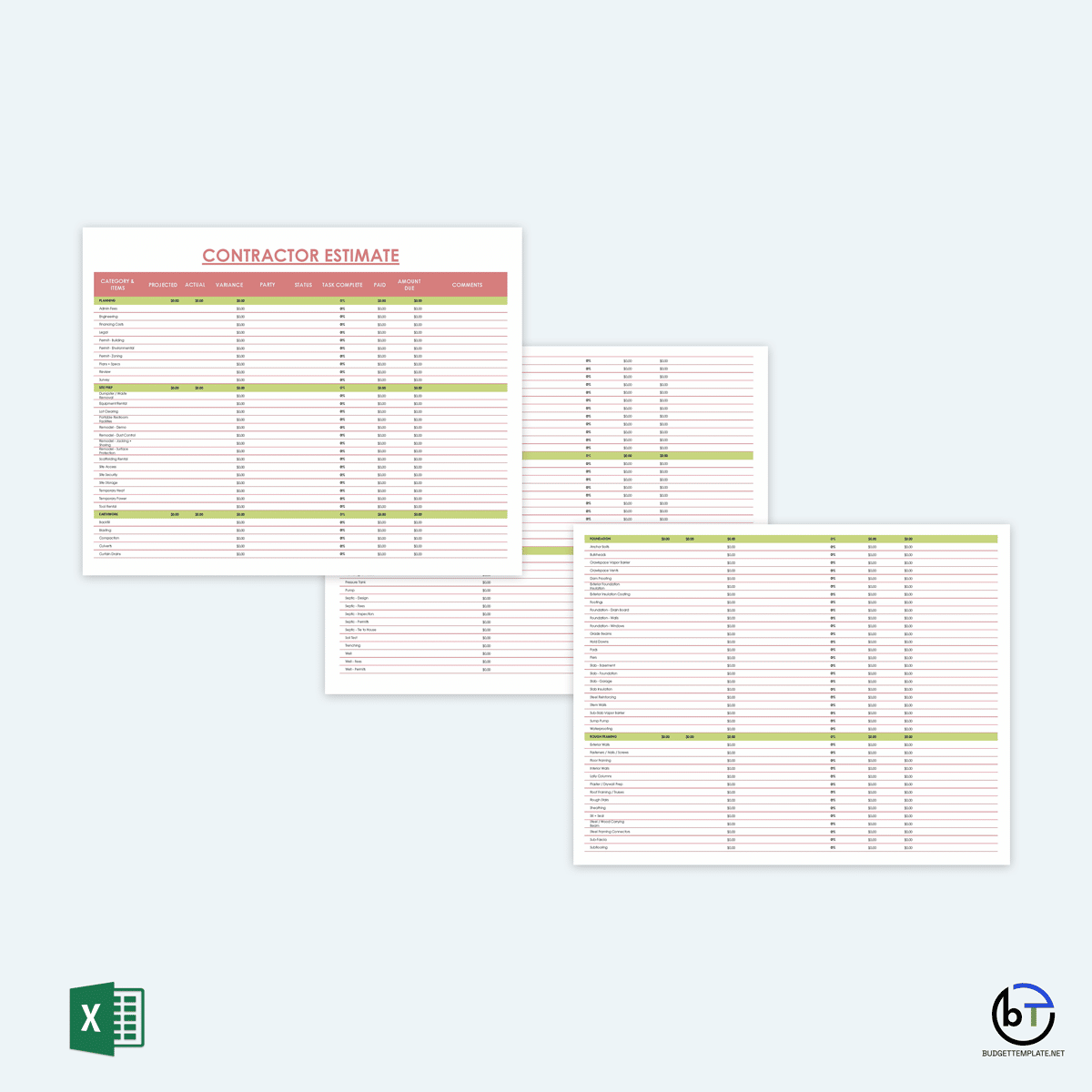
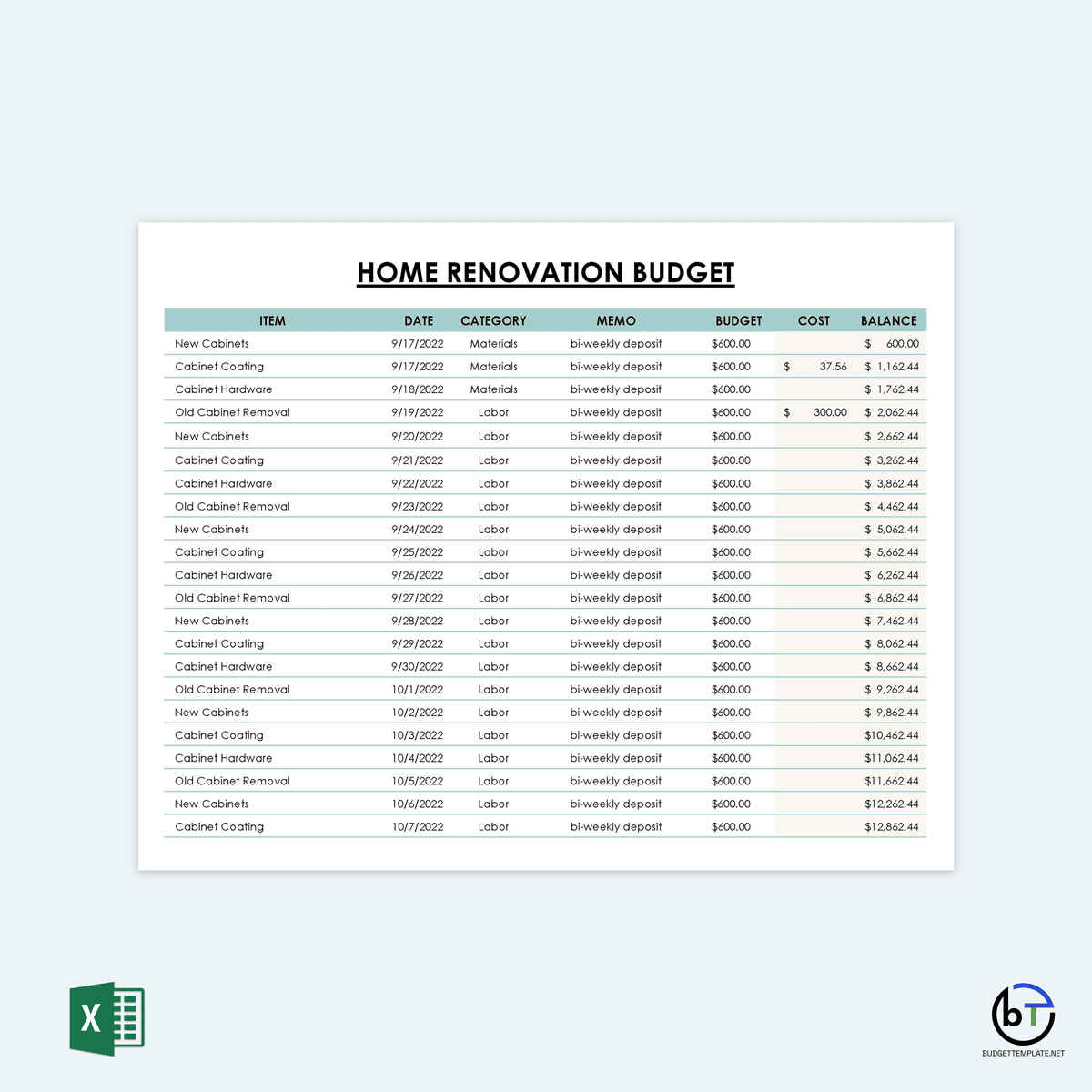
Professional Budgeting Tips
While all construction budgets will be a little different, you want to make sure that you create an accurate plan and can get things done. The following tips will help you create a budget you can stick with during construction:
- Research the costs: Never guess the costs you will have when you start a construction project. Even if you just completed a similar project, you could be way off. Get quotes from your suppliers and subcontractors to see how much they are charging right now for their services and use this in your construction budget.
- Make a list of tasks: Each project will have multiple tasks that need to get done; rather than feeling overwhelmed by all of the work that you need to get done, take the time to break down the project into smaller, individual tasks. This makes it easier to determine how to schedule the project, how much money each task needs, and how many employees need to help get it done on time.
- Estimate costs: Allocate your budget based on the initial cost estimates you come up with. This will help you see whether you have enough money for the project to start or if some changes need to be made. Do not forget to account for all of the costs that will come up and save room for the contingency to give you some wiggle room.
- Be realistic: It would be best to be realistic about the costs you will incur during your project. Your goal is to avoid overspending on the materials. You can avoid overspending by seeking out bids from more than one supplier and choosing the products that fit within your financial resources.
- Get approval: When you are done filling out your construction budget template, you need to get approval before moving forward. The go-ahead will come from different people based on how the project is run, but never start until your boss or the client approves the work you have done. This saves your time and can help catch potential issues that may show up in your math.
- Review the budget regularly: Your initial budget and cost estimates provide a good starting point on the project. It also works to control some of the costs as much as you can from the beginning. You must keep up on the budget and track it the whole time. This helps you determine if you can stay on budget or not during the project and gives all parties time to come up with a plan if the project is going over budget.
Tip To Avoid: Inaccurate estimates are one of the worst mistakes you can make. It is hard to keep your construction budget in line if the estimates are off. And often, the problem is magnified because you have no project schedule in place before you do your budgeting forecast. Avoid looking only at the bottom line as well.
This leads to a bad habit of picking the lowest bids from a general contractor rather than finding someone who knows how to do the job. The lowest bid may help your bottom line, but the quality of the work will be disappointing and will cost your reputation in the process. Overall, make sure you have a good plan before starting any project. Without a plan, your project will slow down, and you will go over budget.
Wrapping Up
A construction budget is a detailed plan of all the money you need to get a construction project done. It will include estimating the materials, labor, and other costs that go into your work. Without this budget, it is hard to know how much you will spend on the final construction project by the time you are done, and you will likely spend way too much and not make any profits. However, with a good construction budget template in place and accurate estimates from the beginning, you can track historical data on your projects and keep track of the costs, helping you complete the construction project successfully.









